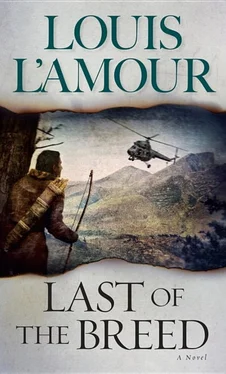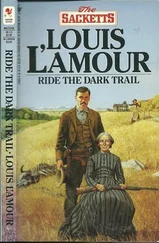Louis L'Amour - Last of the Breed
Здесь есть возможность читать онлайн «Louis L'Amour - Last of the Breed» весь текст электронной книги совершенно бесплатно (целиком полную версию без сокращений). В некоторых случаях можно слушать аудио, скачать через торрент в формате fb2 и присутствует краткое содержание. Город: New York, Год выпуска: 2010, ISBN: 2010, Издательство: Random House Publishing Group, Жанр: Триллер, Историческая проза, Приключения про индейцев, на английском языке. Описание произведения, (предисловие) а так же отзывы посетителей доступны на портале библиотеки ЛибКат.
- Название:Last of the Breed
- Автор:
- Издательство:Random House Publishing Group
- Жанр:
- Год:2010
- Город:New York
- ISBN:978-0-553-89935-1
- Рейтинг книги:3 / 5. Голосов: 1
-
Избранное:Добавить в избранное
- Отзывы:
-
Ваша оценка:
- 60
- 1
- 2
- 3
- 4
- 5
Last of the Breed: краткое содержание, описание и аннотация
Предлагаем к чтению аннотацию, описание, краткое содержание или предисловие (зависит от того, что написал сам автор книги «Last of the Breed»). Если вы не нашли необходимую информацию о книге — напишите в комментариях, мы постараемся отыскать её.
Last of the Breed — читать онлайн бесплатно полную книгу (весь текст) целиком
Ниже представлен текст книги, разбитый по страницам. Система сохранения места последней прочитанной страницы, позволяет с удобством читать онлайн бесплатно книгу «Last of the Breed», без необходимости каждый раз заново искать на чём Вы остановились. Поставьте закладку, и сможете в любой момент перейти на страницу, на которой закончили чтение.
Интервал:
Закладка:
“And to you, I think.”
She shrugged. “Peshkov wants to give the orders. He also wants me,”
“I suspected as much.” Joe Mack turned to go. “If you have trouble I will handle it.”
During the week that followed he saw nothing of Peshkov, but nothing of Talya, either. He killed a wapiti and brought in more than three hundred pounds’ of meat. His traps yielded well, and in his cave he made two packs, one for Wulff and the other to be sold for whatever the furs would bring. There was, he understood, a black market in furs.
Now, with time in which to do so, he prepared his skins carefully, as he had been taught to do. Each time he met any of the people of the commune he tried his Russian upon them. It was true, as he soon became aware, that the miners’ children had been speaking Russian, and a few words came back to him now. Occasionally he would hear a word spoken by one of the village people that he recognized. In school the children had talked English, but among themselves they reverted to the tongue spoken at home.
In the third week he left the stream where he had been trapping and went up the mountain to the north and set his snares in the headwaters of several small streams there. It was an area that did not seem to have been trapped, far from the village and where he found no tracks of men or any sign that anyone had ever been there before.
His take was rich. From the first setting of the snares he had success. Squirrels, Baronas had told him, were much in demand, and he found them in numbers. He also caught ermine, blue fox, and marmot, whose fur was much sought after. Several times he saw tracks of large bear; from their paw prints it was obvious they were some type of grizzly.
Squatting beside a stream one late afternoon, he considered his position. If he could sell furs he might accumulate a little money to pay his way, if need be. He was progressing with his learning of Russian. Meanwhile he had learned that many of the aborigine population, and he might pass as one, spoke little if any Russian. The Koriak, Yakut, and Lamut peoples had only a smattering of the language. Before spring he must concoct a story he could tell, a cover story that would be plausible enough to be accepted. At least until they had time to think, and by that time he could be gone.
Kyra Lebedev was a beautiful woman who made every effort to appear plain. She had discovered long ago that beautiful women did not advance as rapidly as the less beautiful. Good looks were an asset in a man’s march to success, but not so with a woman. Men suspected you had no brains, and other women were jealous. Success was important to her, and she had quickly taken the measure of Comrade Shepilov. He was an intelligent man, but he was lacking in energy. He wanted success and expected it to come to him. He advanced steadily until suddenly he found himself moving forward alongside Arkady Zamatev.
From the first he recognized the threat. Shepilov was lazy, sometimes careless, an undeviating Party man but one who liked good living and made sure that it came his way.
Zamatev ignored the trappings and the benefits. He did each job thoroughly and efficiently. His bureau functioned with fewer helpers than any other. Every job given to him was done with speed and finesse. There was less waste in his department than in any other in central Siberia, and he had carefully weeded out the alcoholics and the timeservers. Kyra Lebedev saw that Zamatev was going somewhere, and she determined to go along with him.
Was she in love with him? Looking into the small mirror in her hotel room she smiled at that. She was not. Did she believe in love at all? She shrugged. She respected Zamatev, and she admired his cool, intelligent way of doing things. One always knew where one stood with Zamatev. Everything fitted; everything fell into place. He made no promises, and she knew she did not fit into his plans for the future. He did fit into hers.
She quite understood what was in his mind, but she also knew that if she wished to reach the higher echelons of government he was her ticket. So, never to demand anything, never to expect anything, never to get in the way, but always to understand, to be helpful and as efficient as he was himself.
She did not know whether Zamatev would achieve his ambitions or not. In fact, she did not believe he would. Such men made their superiors uneasy. Not that they might fear his success, but that his very efficiency and drive might force them to move faster than they wanted. The men in staff positions in any army were rarely there for their skills, but because they were easy to get along with. Men in command did not want abrasive types. They had come to the top, and now they wished to relax. They wanted men who were socially acceptable and just reasonably efficient.
Zamatev might get somewhere. Occasionally such men did. Gorbachev had done it; others almost had, but they failed by being a little too sure of themselves.
Nevertheless, Arkady Zamatev was on his way and he would go far, and Kyra intended to go with him until such a time as she should cut loose and be on her own. If Zamatev recaptured the American, it was positive that he would go on to Moscow. So the American must be retaken.
Wulff was the man in charge here. She knew very little about him that was good. His department was administered but poorly; nonetheless, he was well connected and seemed solidly in control. It was not the first such situation she had seen. His department created no problems for his superiors. The results might not be the best but whatever happened in his area was confined to that area, and no one wished to create problems where none seemed to exist. Discipline was harsh, according to rumor, and there were other rumors that his superiors profited nicely from the situation. Whatever else might be said of him, Wulff was in control, and if she was to get cooperation she must move with care.
Wulff knew Arkady Zamatev and would be wary of crossing him. What she sought was cooperation and a hands-off attitude from Wulff. He was not, she had gathered, an ambitious man. He had what he wanted and wished it to remain as it was. He would not, she was sure, want anybody rocking the boat when it was moving so smoothly.
He received her sitting behind a table. He was a fat but solid-looking man, partially bald, with round, wary eyes. His lips smiled, but his eyes measured her for problems.
“I have heard nothing,” he assured her, after she had explained, “and I would have heard. Of course, it is a large area, and if you are right and he has come this way, we must find him.”
“I would prefer not to disturb you or your department,” she suggested. “I want to be free to move about. I believe I know what must be done.”
“Of course, but you must be prepared. It is very wild out there. It would be best, I believe, if you remained here in the city. We are remote, but it can be very pleasant, and we would enjoy entertaining you.” He smiled. “My wife would be particularly happy, as we have too few visitors.”
“I should like to meet her, but there is much to do, and I wish to be,” she smiled, “where the action is.”
She was, Wulff thought, a striking woman. She worked for Zamatev? Was there anything going on there, he wondered? Well, why not? Arkady was a single man. But hard, he thought, very hard.
“Is there any word from hunters? Prospectors? Engineers? I mean, of anything unusual? Any strangers? Any thefts?”
He smiled, shaking his heavy head. “Nothing. We have thought of all that, and we’ve been out around the country.” He smiled again. “As you have.”
Her smile was a little tight. “Flying over the country we saw a place—”
“I know,” he said, “my men were there some time ago.” He did not want strangers nosing about, and the sooner he got rid of this one the better.
Читать дальшеИнтервал:
Закладка:
Похожие книги на «Last of the Breed»
Представляем Вашему вниманию похожие книги на «Last of the Breed» списком для выбора. Мы отобрали схожую по названию и смыслу литературу в надежде предоставить читателям больше вариантов отыскать новые, интересные, ещё непрочитанные произведения.
Обсуждение, отзывы о книге «Last of the Breed» и просто собственные мнения читателей. Оставьте ваши комментарии, напишите, что Вы думаете о произведении, его смысле или главных героях. Укажите что конкретно понравилось, а что нет, и почему Вы так считаете.












